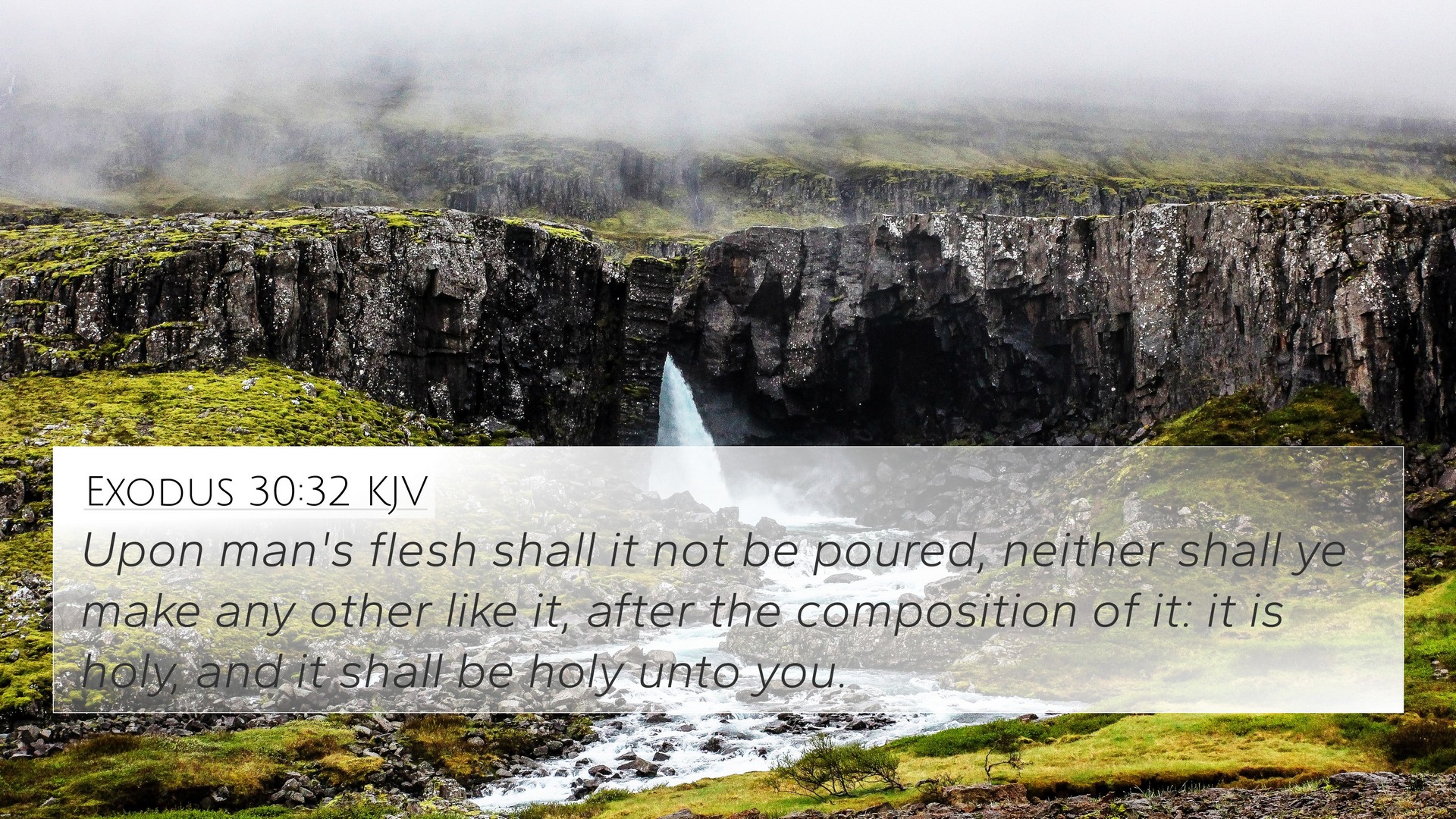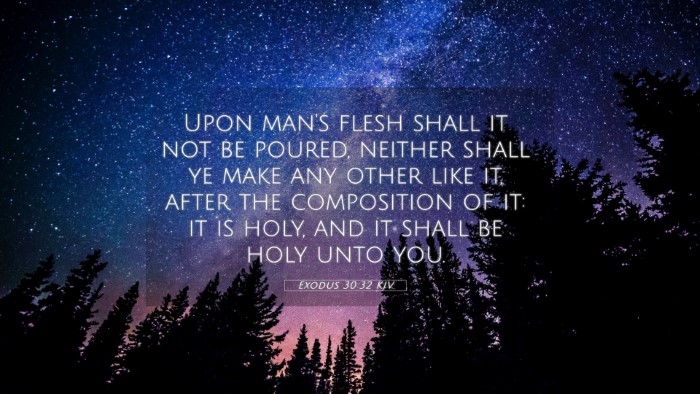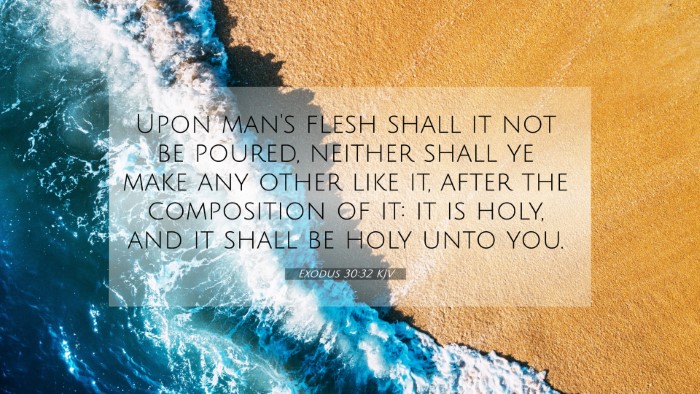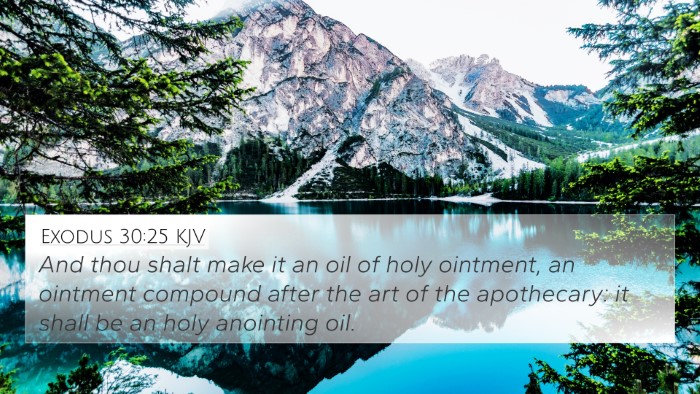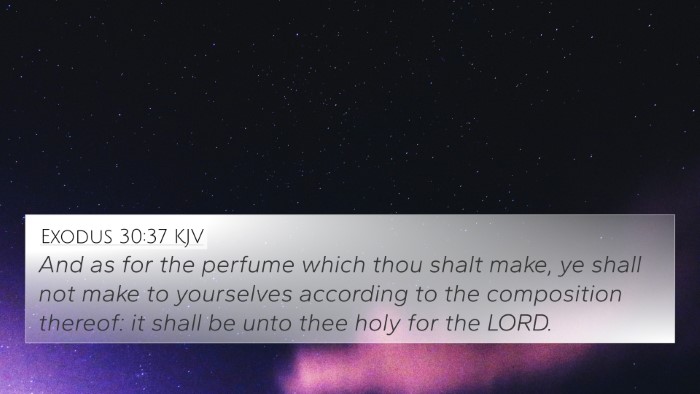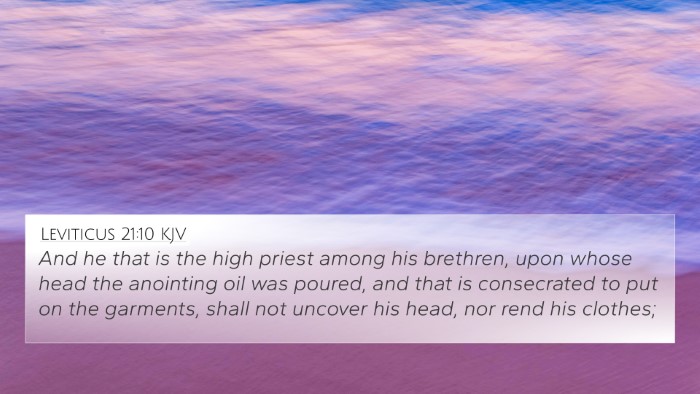Understanding Exodus 30:32
Verse Reference: Exodus 30:32 states, "Upon man's flesh shall it not be poured, neither shall ye make any other like it, after the composition of it: it is holy, and it shall be holy unto you."
Summary of Exodus 30:32
This verse is part of God's instructions to Moses about the holy anointing oil. It emphasizes the sacredness of the oil and the specific prohibition against using it for personal or common purposes. The intent is to underscore the holiness of the anointing oil, which was exclusively reserved for consecrating holy persons and objects.
Insights from Public Domain Commentaries
The following insights from Matthew Henry, Albert Barnes, and Adam Clarke help to elucidate the meaning of this verse:
-
Matthew Henry:
Henry highlights that the anointing oil, being distinctively holy, signifies God's special presence and authority. He argues that the prohibition against pouring it on man's flesh serves to protect its sanctity, setting a clear boundary regarding its usage. The exclusivity of the oil reflects a larger theme of holiness in worship and service to God.
-
Albert Barnes:
Barnes adds that the oil was not to be imitated by anyone, stressing the unique divine character of the formula given by God. Imposing any common use on this sacred oil would detract from its intended purpose, which is to signify consecration and divine empowerment for sacred duties.
-
Adam Clarke:
Clarke reinforces that the oil's holiness is intrinsic, drawing attention to the importance of maintaining purity in religious practices. His commentary suggests that this verse serves as a warning against irreverence towards anything set apart for God and symbolizes how God’s provisions must be respected and rightly utilized.
Bible Verse Cross-References
Exodus 30:32 can be cross-referenced with the following scriptures to enhance understanding:
- Exodus 29:7: Establishes the importance of anointing as a consecration process.
- Leviticus 8:12: Discusses the application of anointing oil to Aaron as part of the priestly ordination.
- 1 Samuel 10:1: Describes the anointing of Saul as king, illustrating the significance of anointing in leadership.
- Psalm 133:2: Reflects on the blessings of unity symbolized through the anointing oil.
- Isaiah 61:1: Reiterates the symbolism of anointing in the context of God’s chosen messenger.
- James 5:14: Discusses anointing in the New Testament, showing continuity in the use of oil for divine purposes.
- 2 Corinthians 1:21-22: Connects the idea of anointing with the sealing of believers by the Holy Spirit.
Thematic Bible Verse Connections
When conducting a comparative Bible verse analysis, one can observe thematic connections between the holiness of the anointing oil and the broader themes of consecration and divine presence through these Bible verses:
-
Holiness and Separation: Exodus 30:32 teaches about setting apart the holy from the common.
- 1 Peter 2:9: Highlights the calling of believers to be a holy nation.
-
Empowerment for Service: Anointing signifies divine empowerment, as seen in:
- Acts 10:38: Refers to Jesus being anointed with the Holy Spirit for His ministry.
-
Jesus as the Anointed One: Cross-references to show Jesus as the fulfillment of the anointing symbolism:
- Luke 4:18: Jesus declares His mission by citing Isaiah's prophecy of the anointed one.
Conclusion
Exodus 30:32's teachings about the holiness of the anointing oil remind us that God’s provisions for anointing carry deep spiritual significance. Understanding this verse within the contextual fabric of scripture enables us to see the connections between God's instructions, the historic acts of anointing in the Old Testament, and their fulfillment in the New Testament through Christ Jesus. A thorough study using tools for Bible cross-referencing can reveal the rich tapestry of divine truths interwoven throughout the scriptures, guiding believers in their walk of faith.
